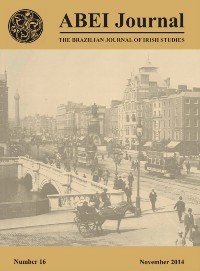Non-Modern Culture in Brian Friel’s Plays
DOI:
https://doi.org/10.37389/abei.v16i0.3561Abstract
This article argues that Friel’s concern with paganism goes beyond his well-known play Dancing at Lughnasa: it actually extends to Faith Healer and Wonderful Tennesssee. Like Lughnasa festival, shamanic healing and the mythological Otherworld are also parts of Irish pagan traditions. By depicting the Irish people’s spiritual world of supernatural power, gods, and realms, Friel shows that pagan cultures are not mummified in the museums or memoirs but alive in their corrupted, erratic forms and interwoven with Christian beliefs and modern rationalities, whose connection with the past and engagement
with the present challenge the mutually excluded category of tradition and modernity, and exemplify what David Lloyd calls “non-modern culture.”
Keywords: Non-modern culture; pagan traditions; shaman; the Otherworld; modernity; hybridity.


